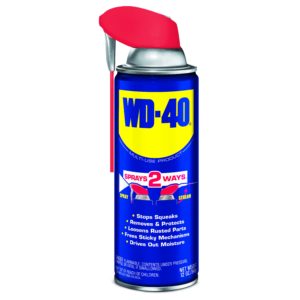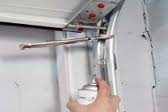Garage door noises are reduced with lubrication. That’s common secret among those who know a thing or two about garage doors. And it’s true. All the same, the elimination of noises is not the only benefit of regular lubrication. Simply put, if you don’t hear loud noises, it doesn’t necessarily mean that your garage door doesn’t need lubrication. And when it makes noises, applying lubricants is not always the best remedy to the problem. There’s always more to this than meets the eye and so, let us take a deeper look.
DIY or pro garage door lubrication maintenance?
 Lubrication is a main task of garage door maintenance. Before we point out the benefits of regular lubrication, let us just say that this task doesn’t solve all problems. And here’s where the professional garage door inspection becomes of great value. Pro techs have the experience to identify if serious damage – damage that the lubricants won’t fix – has already occurred and so provide other solutions to fix the problem.
Lubrication is a main task of garage door maintenance. Before we point out the benefits of regular lubrication, let us just say that this task doesn’t solve all problems. And here’s where the professional garage door inspection becomes of great value. Pro techs have the experience to identify if serious damage – damage that the lubricants won’t fix – has already occurred and so provide other solutions to fix the problem.
It’s also important to pinpoint that the quality of lubricants used and how much lubricant is applied to the parts both play a role in the outcome. Most garage door companies use lithium or silicone spray lubricants. Also, the techs do not over-lube the parts but use moderate portions to achieve the expected results.
So, which are the main advantages of regular garage door lubrication and why?
Silent garage door movement
Lubricants quiet down garage doors. It’s true. That’s actually the main reason why lubricants are used, and why they are considered the likely solutions to some garage door noises. You see, the lubricants become the layer of protection between the parts. They keep metal from meeting metal, and thus reduce the noises dramatically. Take for example, the garage door rollers that move on the tracks. If they are both made of steel and there are no lubricants between them, the garage door will make noises.
Smooth garage door operation
The layer of lubricants between parts doesn’t only eliminate the noises, but also makes the movement of the garage door smoother. The overhead garage door goes up and down with ease. Here’s where the expertise of a pro will make a difference. You see, when you overdo it with the lubricants, the excess oil will drip on the floor or your car. The garage door might go up and down much smoother than it is supposed to. So, if you lubricate yourself, make sure to wipe the excess lubes off.
Long-lasting garage door parts
 With the lubricants acting as the protective layer, the parts last longer. Think of our garage door tracks and rollers example once again. Without the lubes, the metal parts will come in contact with the other metal parts, causing damage. And so, the lubricants don’t only reduce noises and make the movement smoother, but also provide protection to the parts. This saves you money in the long run. You won’t need garage door tracks replacement often.
With the lubricants acting as the protective layer, the parts last longer. Think of our garage door tracks and rollers example once again. Without the lubes, the metal parts will come in contact with the other metal parts, causing damage. And so, the lubricants don’t only reduce noises and make the movement smoother, but also provide protection to the parts. This saves you money in the long run. You won’t need garage door tracks replacement often.
And there’s more. Lubricants also protect against corrosion. Not only do they protect parts from getting damaged, but also from getting rusty. Take the garage door springs, for instance. They consist of coils which might get rusty if they are not lubricated. When they get rusty, the springs become noisy and eventually break – sooner than expected. That’s bad for your wallet and also a safety concern.
Lubricants work miracles in areas, where there’s a high level of moisture. With the garage door lubricated regularly, the possibility of corrosion is distanced. And so, the possibility of early garage door replacement is distanced too. This will also save you money. Isn’t it preferable to have your garage door lubricated on a regular basis?






